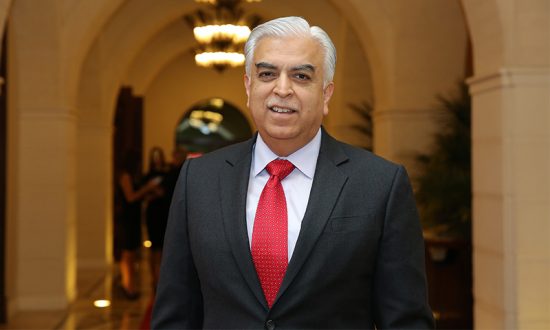Coming from a humble, middle-class, extremely value-based background, Niranjan Gidwani is the Consultant Director, Member UAE Superbrands Council and Former CEO of Eros Group Dubai. Mr. Gidwani is known for his vision and his ability and expertise to build regional groups and organisations into brands. He is a degree holder in Mechanical Engineering and an MBA from the Symbiosis Institute of Management, Pune, India. He has also attended several top management courses at institutions such as the Indian Institute of Management Ahmedabad, the Seven Habits program under Dr Steven Covey and several others across the world. Mr. Gidwani has over 38 years of hard-core senior management experience with a strong exposure to handling international business. Out of these 38 years, he has had working stints in India, Hong Kong, Germany, Singapore and Dubai. Dubai has had the longest stint of 28 years.
A man and a young teenage boy checked in to a hotel and were shown to their room. The two receptionists noted the quiet manner of the guests, and the pale appearance of the boy.
Later, the man and boy ate dinner in the hotel restaurant. The staff again noticed that the two guests were very quiet, and that the boy seemed disinterested in his food. After eating, the boy went to his room and the man went to the reception and asked to see the manager. The receptionist initially asked if there was a problem with the service or the room, and offered to fix things, but the man said that there was no problem of that sort, and repeated his request. The manager was called and duly appeared. The man asked to speak privately and was taken into the manager’s office.
The man explained that he was spending the night in the hotel with his fourteen-year-old son, who was seriously ill, probably terminally so. The boy was very soon to undergo chemo and radiation therapy, which would cause him to lose his hair. They had come to the hotel to have a break together, and also because the boy planned to shave his head, that night, rather than feel that the illness was beating him.
The father said that he would be shaving his own head too, in support of his son. He requested that the staff be respectful when the two of them came to breakfast with their shaved heads. The manager assured the father that he would inform all staff and that they would behave appropriately.
The following morning the father and son entered the restaurant for breakfast.
There they saw all the four male restaurant staff attending to their duties, perfectly normally, all with shaved heads.
That is the essence of empathy.
I have been one of those extremely fortunate ones who has had this huge opportunity to use the past 18 months to convert my sudden setback into a more meaningful phase, taking it as a forced break. There is no other way I would have done what I could do, which is to be around family, friends and colleagues whose need for assistance has been greater than mine. I have been around some who have been afflicted by a critical illness. And I have also had the opportunity to deeply observe how the best, who know you for decades, can shut down on you. That’s such a major learning which no school of management could have taught.
After the experience of the last two years of covid, to most of us, it is now clear that major disruptions will be a constant, whether from geopolitics or technology advancements. The impact could be bigger than the past one hundred years.
If we look around and do serious introspection, the number one global priority now is empathy. Somewhere along the past several decades, compassion and empathy have taken a serious nosedive. We are human beings, and we must treat each other like that first before interacting with each other as friends, family, executives or professionals. The idea of being kind to each other, to stay connected, needs to come back. This does not cost much, and will serve the world better.
Empathy also has close links to being less wasteful.
Our generation, knowingly or unknowingly, has turned hugely wasteful over the last 15 to 20 years. Until now, the concern was not too much because companies were raking in profits. However, newer companies, younger leaders, and the new generation have started embracing the idea that any cost that does not lead to value creation needs to be controlled or eliminated. That also helps in leaving a better climate legacy for our future.
The younger generation also knows that, while increasing their empathy quotient, global consumers need constant excitement. Therefore, the high-quality innovation engine must be running, and it is the most important engine for the future growth of the world, while trying to find truly disruptive solutions to global issues.
This phase of our lives has given everyone the opportunity to improve their soft skills and to demonstrate their humanity towards others, whether or not any of us occupies a leadership position. We need to operate with the premise that each of us is a leader of our own existence. Only a few thousand can become CEOs across the world. But all can be CEOs of our own existence.
Increasing the levels of empathy, compassion and positive acceptance during these times, while helping each other to embrace our struggles and find resolutions to them will grow our resilience towards life and its many twists and turns.
As is said, Sympathy is easy. We all have sympathy for starving children when we see them from our fancy cars, or swatting flies on the late-night commercials. Sympathy is easy because it comes from a position of power.
Empathy is actually getting down on your knees, looking at someone else in the eye, and realizing that we could be them, and that all that separates us from them is luck and destiny.


